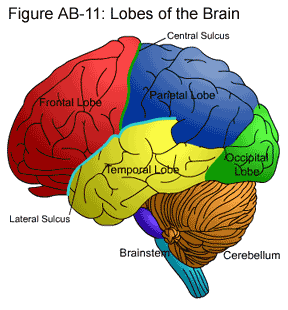What goes on in your brain when you think about space?
As you undoubtedly know, the brain is a pretty complex organ: multiple parts, many functions, incredible plasticity. I'm not a biologist, but I'll bet that there is no more versatile organ in evolutionary history than the human brain.
When we work with geospatial tools, we're using many, many different parts of the brain (along with other parts of the nervous system)--it's something like a whole-body workout for the brain.
Since most of the data we'll be working with is visual (maps, images, numbers, etc.), let's begin with the optic nerve, passing information back to the occipital lobe. (True, there is a strong spatial component to hearing, especially since we have ears on either side of our heads. Some humans, in fact, have mastered a form of echolocation, but since tongue-clicks are not one of our geospatial tools, we'll be sticking with visuals.)
The visual data that has a spatial component (e.g., the colors, shapes, and symbols on a map) are processed in the parietal lobe, which does the spatial reasoning. (As a counter-example, seeing what happens when the parietal lobe is damaged, see the symptoms of Balint's syndrome)
The frontal lobe does all of the more abstracted work: de-coding labels and other text on the map, making mathematical calculations (e.g., what you had to do during the geocache, calculating whether you needed to move to a higher or lower latitude and hence go further north or further south), and doing the higher-order calculations such as correlation.
Wow! That's a lot, correct?
But you're not done! We've only described what's going on with your spatial reasoning in working memory. The vast majority of the time, you're also drawing upon your spatial memory. Spatial memory is distributed in many places in the brain, with some bias towards the right hemisphere. In fact, to consider the amount of work that can be done by spatial memory, consider the case of London cab drivers' knowledge of the city.
The point of this is: Geospatial conceptions and geospatial thinking are very, very complex.
Given that this is the case, don't feel bad if you struggle with something during the semester: what you're doing is complicated! You'll need help now and again!
In the next section, we'll break down what you're brain is thinking about as the synpases in these different parts of the brain are working together: What are the components of spatial understanding?

